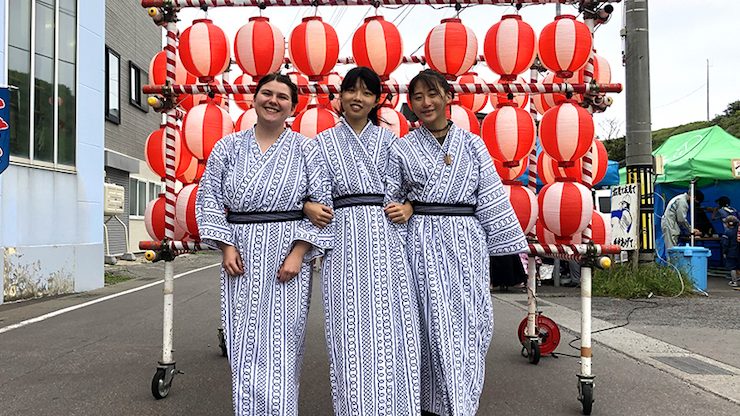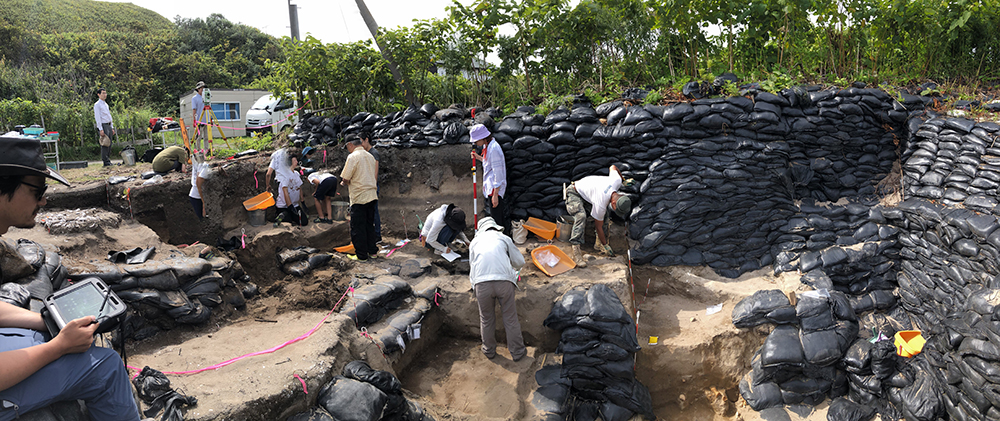
When Alyssa Booth, now in her senior year, was trying to decide on a major, she wasn't sure which one was right for her. She wanted to choose a major that could take her across the globe, so she decided on anthropology. Little did she know that she "picked the perfect field" and would spend this past August in Japan learning more about an indigenous Japanese people, the Ainu.
When Alyssa Booth, now in her senior year, was trying to decide on a major, she wasn’t sure which one was right for her. She wanted to choose a major that could take her across the globe, so she decided on anthropology. Little did she know that she “picked the perfect field” and would spend this past August in Japan learning more about an indigenous Japanese people, the Ainu.
“You know how sometimes people say ‘Don’t get too excited because it’s going to be a letdown?’ It wasn’t. It was everything I was hoping for,” said Booth.
Initially, Booth shared her interest in studying abroad with Kathryn Krasinski, PhD, assistant professor of anthropology. Dr. Krasinski reached out to a colleague who suggested the Ainu field site. When Booth found out about the program, she said, “I thought, ‘This is perfect. This is where I want to be. It’s discussing the topics that I’m interested in.'” She applied and was accepted. Because she was working as a lab assistant on a project in which ancient Asian technology is relevant to understanding woolly mammoth extinction in Alaska, Booth was awarded a travel stipend for her trip.
While on the plane, Booth “couldn’t believe it was actually happening,” she said. For years, she’d been so fascinated with Japanese culture that she chose it as her sophomore year independent study topic and is minoring in Asian studies.
“I’ve always been interested in Japan because I think their culture is very interesting, especially since they were isolated from others,” she said. “Plus, I like anime. Not gonna lie.”
 Digging Into the Past
Digging Into the Past
Booth roomed with eight other female students from all over the world. They’d all wake up early to go to the field site and dig. Then one group would go to the lab to study what was found while the other group would go to different grid sections to find artifacts that might reveal clues about the Ainu.
She spent time working in a section of the dig site that was a few centuries old. Artifacts she found included pottery with designs, Ainu knives and bone tools that archaeologists can study to help them determine what foods members of the group ate.
Booth got to experience the sights, sounds and tastes of contemporary Japan as well as study its past. Lunch was often in the form of a bento box—Japanese cuisine items such as rice or noodles, fish or meat, and cooked vegetables. Most nights, Booth and her roommates ate dinner together like a family.
Living in the Present
When she wasn’t digging, Booth would go out and explore. One of her favorite things to do was hike in northern Japan. She went to the tip of the island and received a stamp to remember her adventure. In September, she shared her experience with the Adelphi community as part of Summer Journey: Archaeology Field School.
“I learned how to live in a place where I can’t speak the language,” she said. “I got a clearer picture of the life of indigenous people in Japan and how it differs from the lives of indigenous people in America.”
Planning for the Future
Booth doesn’t want to stop here. After graduating, she plans to teach English and possibly earn her master’s degree in Japan. She also wants to help more people on a broader spectrum learn about indigenous people in Japan such as the Ainu.
“The only way they’re going to get indigenous rights is if more people know they exist,” she said. “I want people who are indigenous to be proud of their heritage and not be ashamed of it.”
For further information, please contact:
Todd Wilson
Strategic Communications Director
p – 516.237.8634
e – twilson@adelphi.edu